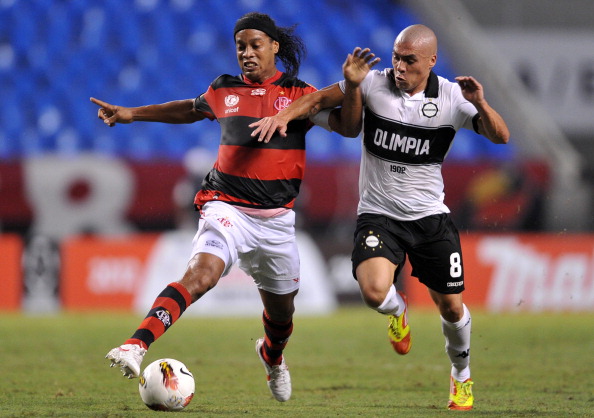By Samindra Kunti
January 18 – Ronaldinho has at last called time on his professional playing career. The 37-year-old has not played at club level since leaving Brazilian side Fluminense in July 2015 and on Wednesday his agent and brother Roberto Assis announced Ronaldinho he has officially retired.
“He has stopped, it is ended,” Assis wrote in a column for Brazilian newspaper O Globo. “Let’s do something pretty big and nice after the Russia World Cup, probably in August. We will do various events in Brazil, Europe and Asia and, of course, we are arranging something with the Brazilian team as well.”
Ronaldinho had long ceased to be the brilliant football player and indomitable genius of his heydays before Wednesday’s announcement. His career declined when he left FC Barcelona in 2008. Pep Guardiola was roundly critiqued for forcing the Brazilian out of the door, but he was later vindicated: the latter stages of Ronaldinho’s career were a tale of disappointments and of what could have been. His exuberant lifestyle overshadowed the innate talent with which he once delighted the world.
At his peak Ronaldinho had two outstanding virtues: his love for the game and his knack for improvisation. He had a pure relationship with the ball and played with glee and exhilaration. Football was self-expression for the Brazilian, and enjoyment. He shared those moments with fans around the World. His weighted free-kick goal against David Seaman in the quarter-finals of the 2002 World Cup knocked England out of the tournament and his famed toe-poke strike against Chelsea at Stamford Bridge will go down as one of the modern era’s most artistic goals.
The toe-poke was a moment of radiant improvisation, one of Brazilian football’s finest virtues. It took a moment to digest how Ronaldinho had scored the goal – with his feints and the outside of his boot. The Brazilian peaked at Barcelona, winning two La Liga titles, one Champions League trophy and one Ballon d’Or, in 2005, in a five-year stay at the Nou Camp. He was a World Cup winner in 2002 with Brazil.
But at the age of just 26, when players begin to peak, the first signs of Ronaldinho’s decline surfaced.
Once Pep Guardiola discarded him in 2008, Ronaldinho’s prime was over. He spent three lacklustre years with AC Milan, claiming one Serie A title in an star-studded team that included David Beckham, Andrea Pirlo and Zlatan Ibrahimovic, before he returned to Brazil in 2011, where he enjoyed various spells at various clubs.
As Ronaldinho partied the night and his football career away, his disconnect with the game grew. In recent months the player aligned himself with Brazil’s far-right Patriota party. ‘Patriota’ Jair Bolsonaro is notorious for his sexist, racist and homophobic remarks. Ronaldinho endorsed Bolsonaro’s presidential campaign – another questionable move from a player who delighted the world with his genius.
Contact the writer of this story at moc.l1713402577labto1713402577ofdlr1713402577owedi1713402577sni@i1713402577tnuk.1713402577ardni1713402577mas1713402577

